Quotes About Cognitive Behavior Therapy
Enjoy collection of 41 Cognitive Behavior Therapy quotes. Download and share images of famous quotes about Cognitive Behavior Therapy. Righ click to see and save pictures of Cognitive Behavior Therapy quotes that you can use as your wallpaper for free.
Our thoughts have prepared for us the
happiness or unhappiness we experience. ~ Hazrat Inayat Khan

Here are a few of the sources I used, and I heartily recommend them: Simon Baron-Cohen, The Science of Evil; Judith Beck, Cognitive Behavior Therapy; Louis Cozolino, The Making of a Therapist; Kevin Dutton, The Wisdom of Psychopaths; James Fallon, The Psychopath Inside; Peter and Ginger Ross Breggin, Talking Back to Prozac; Robert D. ~ Lisa Scottoline
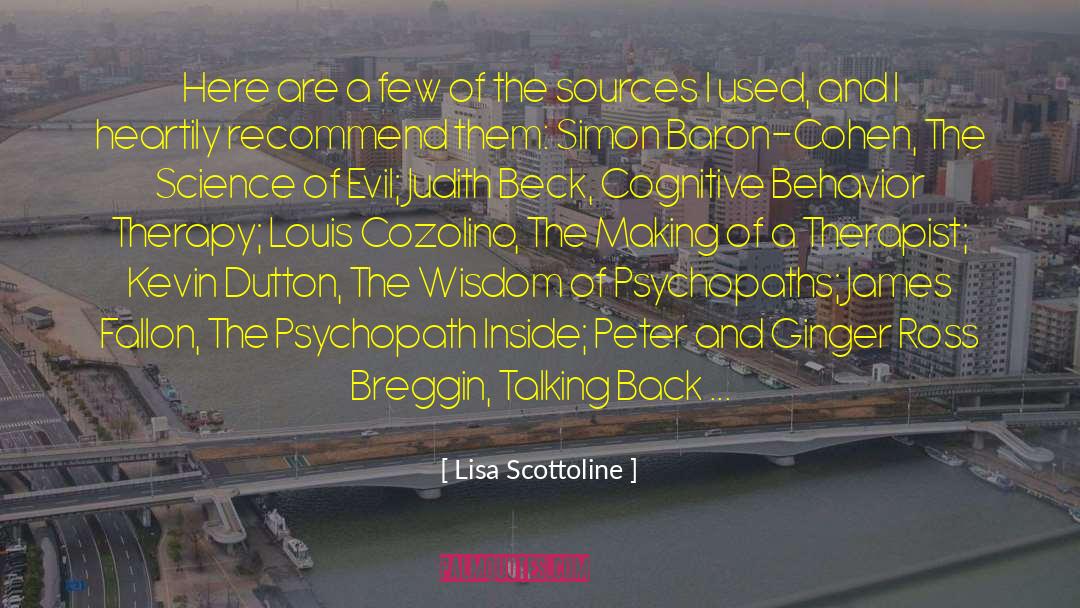
For people who are depressed, and especially for those who do not receive enough benefit from medication of for whom the side effects of antidepressants are troubling, the fact that placebos can duplicate much of the effects of antidepressants should be taken as good news. It means that there are other ways of alleviating depression. As we have seen, treatments like psychotherapy and physical exercise are at least as effective as antidepressant drugs and more effective than placebos. In particular, CBT has been shown to lower the risk of relapsing into depression for years after treatment has ended, making it particularly cost effective. ~ Irving Kirsch

Someone's got to do some more research, but I would really like to know: when a CBT therapist really gets distressed, who does he go see? ~ Irvin D. Yalom

In California, there was Atascadero State Hospital, constructed in 1954 at the cost to taxpayers of over $10 million (almost $110 million in today's money). Atascadero was a maximum-security psychiatric prison on the central coast where mentally disordered male lawbreakers [including homosexuals] from all over California were incarcerated. Inmates were treated at Atascadero by a variety of methods, including electroconvulsive therapy; lobotomy; sterilization, and hormone injections. Anectine was used often for 'behavior modification.' It was a muscle relaxant, which gave the person to whom it was administered the sensation of choking or drowning, while he received the message from the doctor that if he didn't change his behavior he would die (10). ~ Lillian Faderman
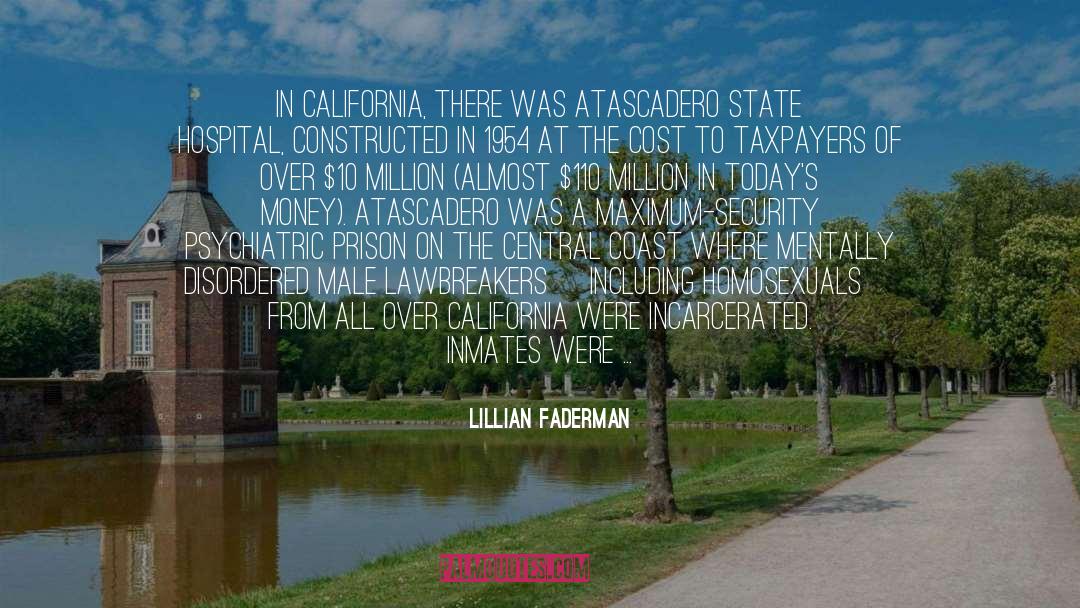
Behavioral Shifts to Overcome Excessive Hesitancy
Important: So far we've been focusing on how tweaking your thinking can help shift your behavior. This is important, but it's only half the story. People are usually quite good at identifying how changes in thoughts or feelings may lead to changes in behavior, such as "When I have more energy, I'll do more exercise" or "When I have more ideas, I'll take more action." However, people tend to underestimate the impact of changing their behavior on their thoughts and feelings, such as "When I exercise more, l'll have more energy" or "When I take more actions, I'll have more ideas." Don't make the mistake of thinking you need to wait for your thoughts to change before you try behavioral shifts. Mental and behavioral shifts go hand in hand. When you start making changes in your behavior (even subtle ones), you'll notice that all kinds of thoughts, including your view of yourself, start to shift. Changing your behavior, without waiting for you thoughts to always shift first, is one of the best and fastest ways you can reduce your anxiety. That's why a cognitive behavioral approach focuses on both thoughts and behaviors. ~ Alice Boyes
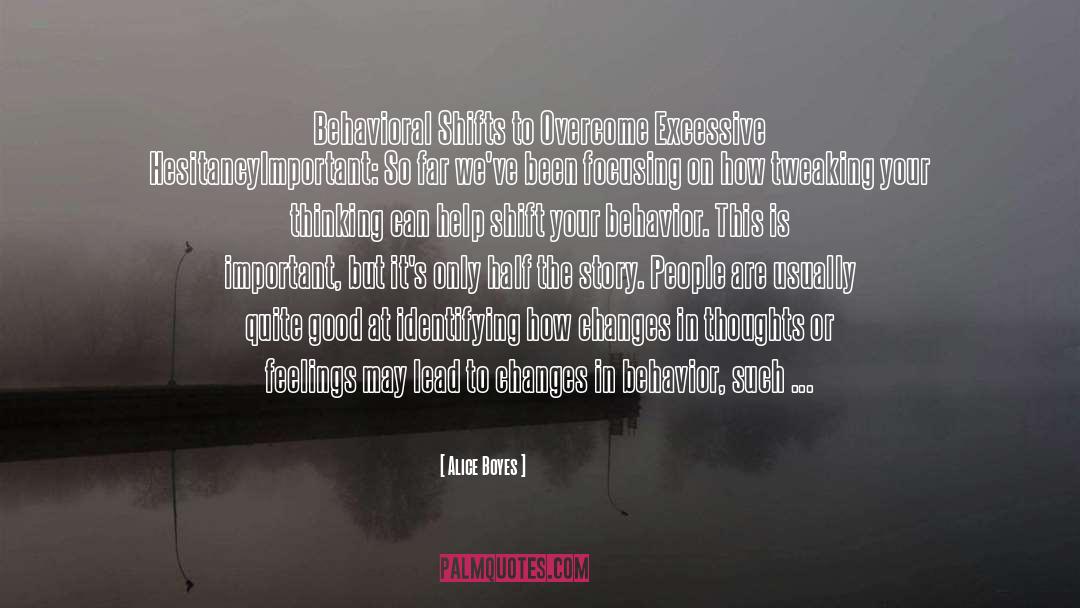
Regression analyses show that self-efficacy contributes to achievement behavior beyond the effects of cognitive skills ~ Albert Bandura
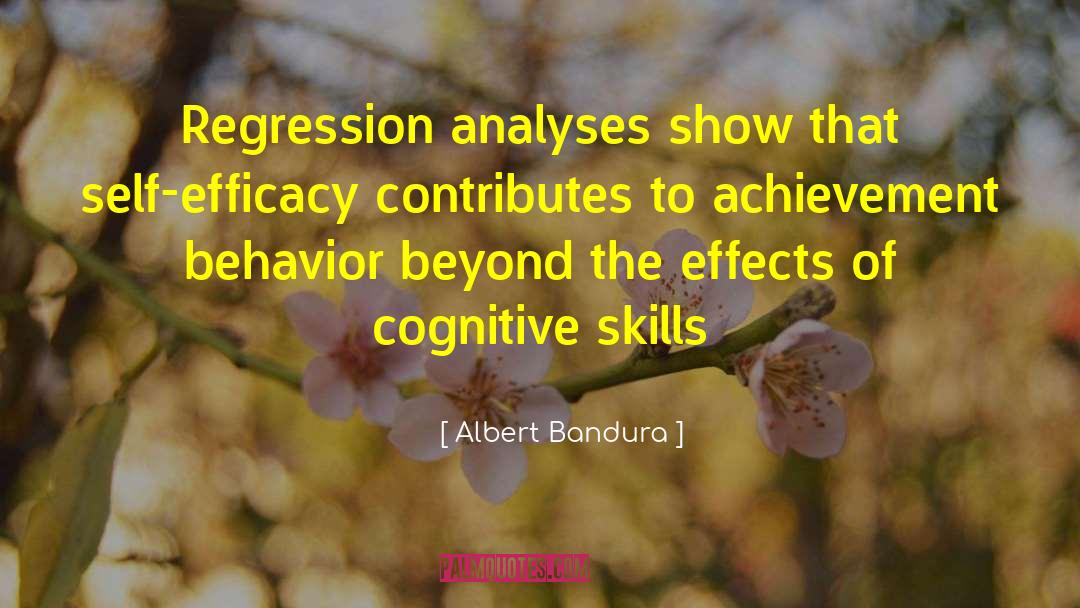
No one really knows why humans do what they do. ~ David K. Reynolds

The children were watched through a one-way mirror, and the film that shows their behavior during the waiting time always has the audience roaring in laughter. About half the children managed the feat of waiting for 15 minutes, mainly by keeping their attention away from the tempting reward. Ten or fifteen years later, a large gap had opened between those who had resisted temptation and those who had not. The resisters had higher measures of executive control in cognitive tasks, and especially the ability to reallocate their attention effectively. As young adults, they were less likely to take drugs. A significant difference in intellectual aptitude emerged: the children who had shown more self-control as four-year-olds had substantially higher scores on tests of intelligence. ~ Daniel Kahneman
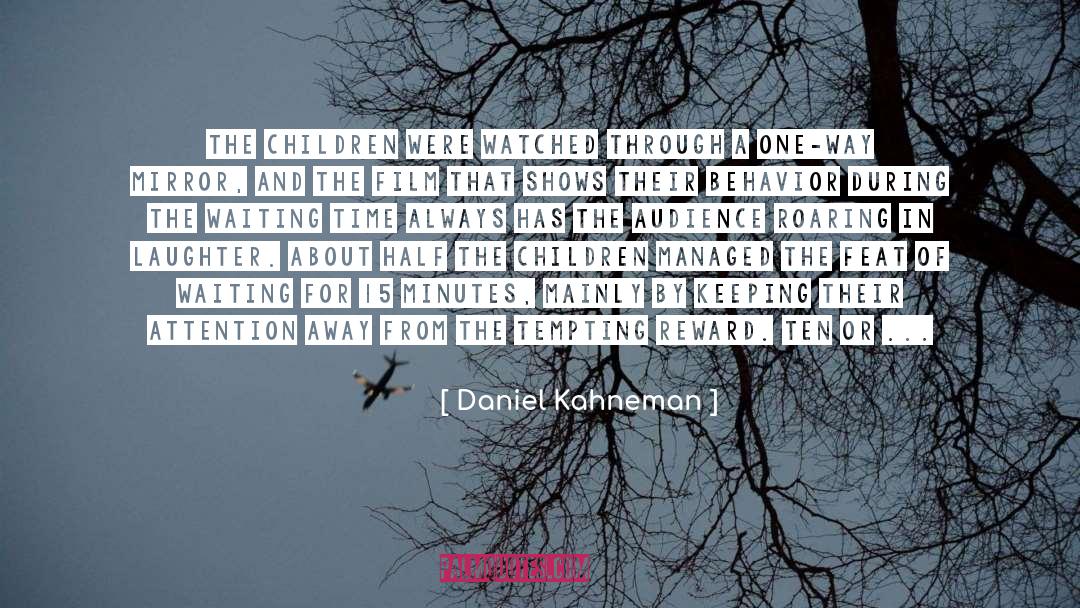
Adding to our understanding of why the brain seems undisturbed by disconnections was not only the notion that it was, in a sense, sending half its decisions into the realm of the unconscious; it was also the discovery of the "interpreter." This special left brain system kept note of all the behaviors that resulted from the many mental systems. It appeared to be the surveillance camera on our behavior, which, of course, was the evidence that a mental or cognitive act had occurred. The interpreter not only took note; it tried to make "sense" out of the behavior by keeping a running narrative going on about why a string of behaviors was occurring. It is a precious device and most likely uniquely human. It is working in us all the time as we try to explain why we like something or have a particular opinion, or rationalize something we have done. It is the interpreter device that takes the inputs from the massively modularized and automatic brain of ours and creates order from chaos. It comes up with the "makes sense" explanation that leads us to believe in a certain form of essentialism, that is, that we are a unified conscious agent. Nice try, interpreter! ~ Michael S. Gazzaniga
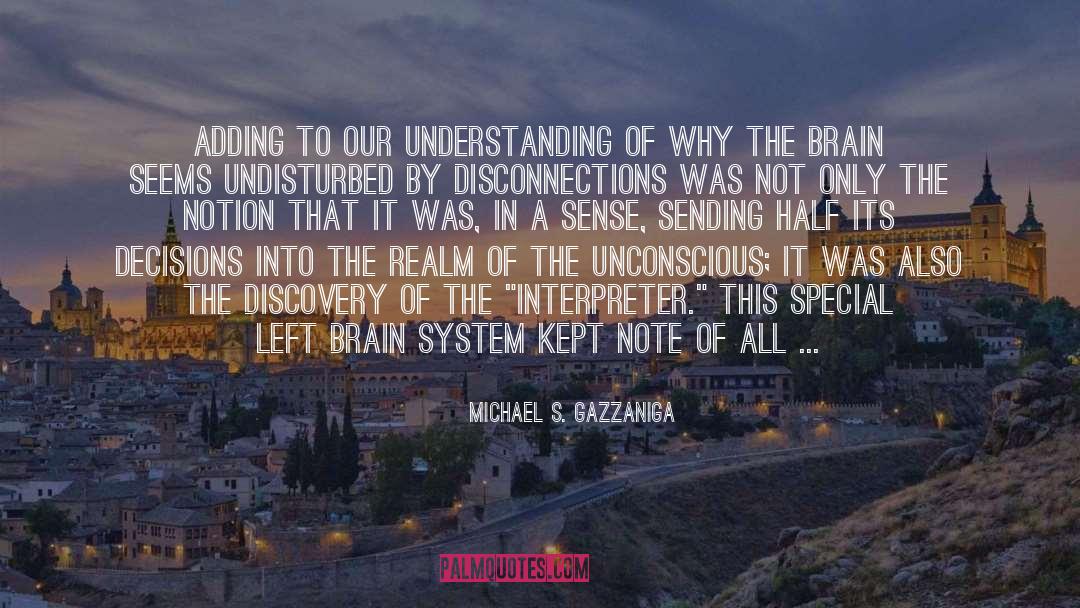
It's like avoidance behavior in therapy - wanting to share the gossip but not wanting to deal with the real, more painful issues. Of course we want to avoid the pain. But by doing so, we inevitably cause more of it. ~ Marianne Williamson
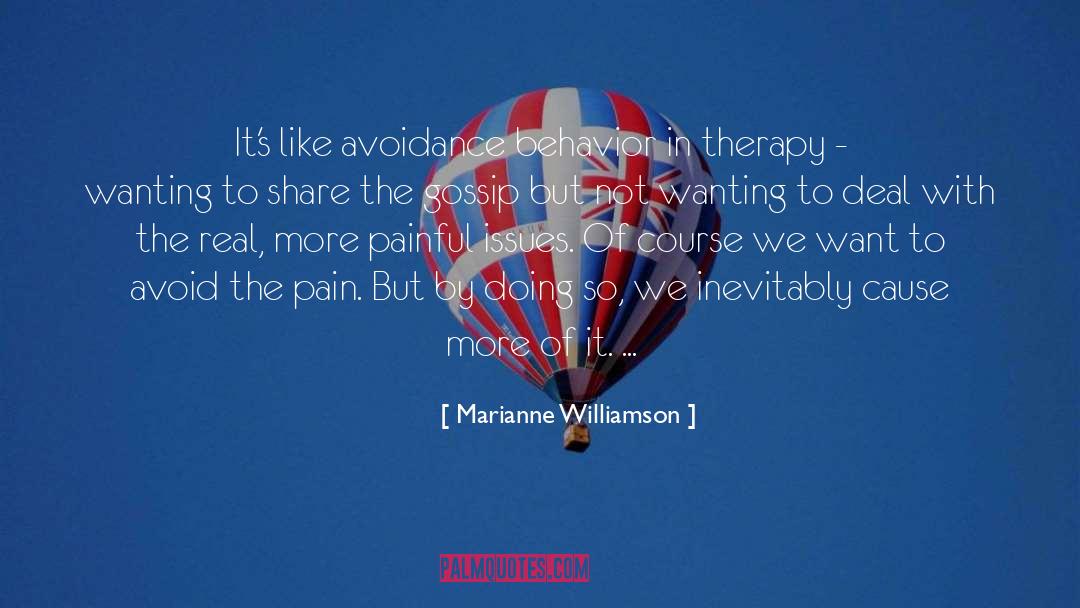
Despite what you might think, NORMAL people do NOT cause problems, misfortunes, conflicts, distress or accidents. And when they do, they CAN apologize and recognize their negative influence. A person that causes these things and can't assume any responsibility for them is, apart from showing the cognitive and moral level of a child, deserving nothing more than abandonment, because she is dangerous at all levels and can hurt, or even kill, someone BY ACCIDENT, including herself and whoever is with her. A person like this DOES NOT deserve any TRUST for ANYTHING, ABSOLUTELY ANYTHING. ~ Robin Sacredfire
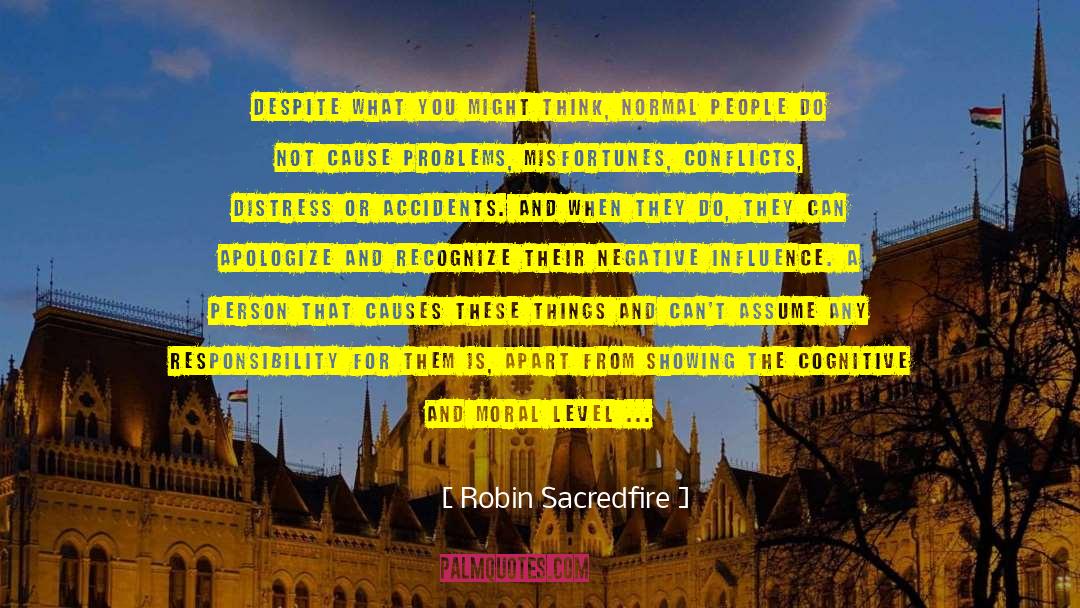
One form of insecurity of attachment, called "disorganized/disoriented", has been associated with marked impairments in the emotional, social, and cognitive domains, and a predisposition toward a clinical condition known as dissociation in which the capacity to function in an organized, coherent manner is at times impaired.
Studies have also found that youths with a history of disorganized attachments are at great risk of expressing hostility with their peers and have the potential for interpersonal violence as they mature (Lyons-Ruth & Jacobwitz, 1999; Carlson, 1998). This disorganized form of attachment has been proposed to be associated with the caregiver's frightened, frightening, or disoriented behavior with the child. Such experiences create a state of alarm in the child. The parents of these children often have an autobiographical narrative finding, as revealed in the Adult Attachment Interview, of unresolved trauma or grief that appears as a disorientation in their narrative account of their childhoods. Such linguistic disorientation occurs during the discussion of loss or threat from childhood experiences. Lack of resolution appears to be associated with parental behaviors that are incompatible with an organized adaptation on the part of the child. Lack of resolution of trauma or grief in a parent can lead to parental behaviors that create "paradoxical", unsolvable, and problematic situations for the child. The attachment figure is intended to be the s ~ Daniel J. Siegel, M.D.

Cognitive psychology considers successive mediating events between the outer world of the organism (environmental input) and the behavior of the organism (response output). The gap between these two endpoints is reputed to be filled by various components (e.g., a complex memory system comprising several constituent parts, an information processing system also comprising several constituent parts, a "cognitive map," or a symbol manipulation machine. ~ Mecca Chiesa

Increased physical activity during the school day can help children's attention, classroom behavior, and achievement test scores. Meanwhile, the decline of play is closely linked to ADHD; behavioral problems; and stunted social, cognitive, and creative development. ~ Darell Hammond
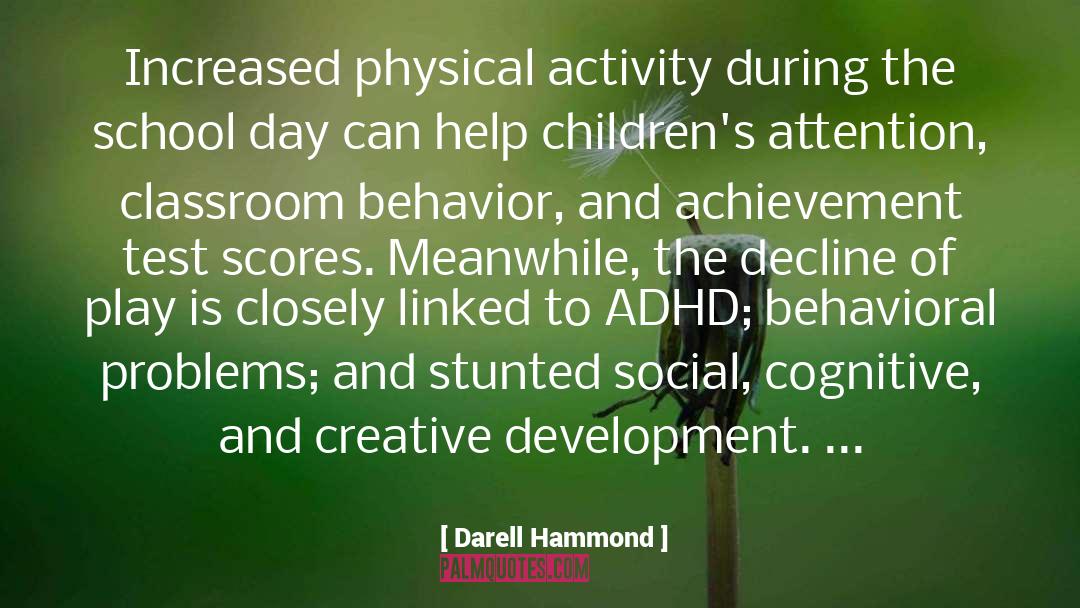
The main reason we learn any habit, as Drs. Frederick Kanfer and Jeanne Phillips tell us in Learning Foundations of Behavior Therapy, is that even a seemingly counterproductive habit like procrastination is immediately followed by some reward. Procrastination reduces tension by taking us away from something we view as painful or threatening. The more painful work is for you, the more you will try to seek relief through avoidance or through involvement in more pleasurable activities. The more you feel that endless work deprives you of the pleasure of leisure time, the more you will avoid work. ~ Neil A. Fiore
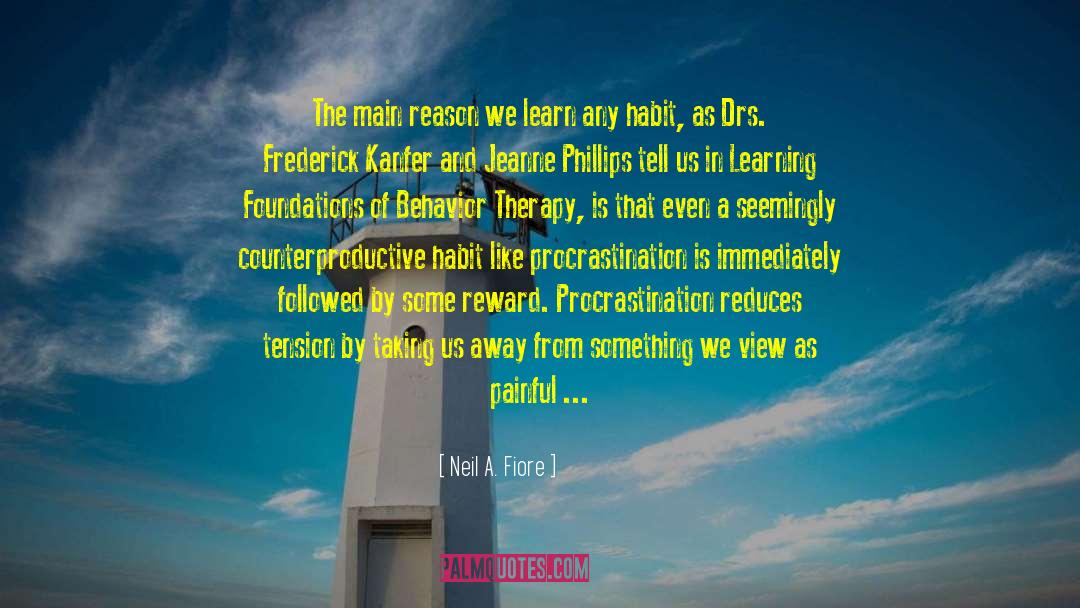
In supportive work, the therapist cedes great control to the patient. It may seem otherwise. The therapist is setting limits, perhaps implicitly commenting on the patient's behavior or sense of self, and so forth, and on the surface it seems that the therapist is taking responsibility for the patient's progress. but all this activity leads nowhere except, if we succeed, to stability. In supportive therapy, change arises in a more or less miraculous way , through the patient's suddenly feeling secure enough to move in a certain direction, perhaps one unanticipated by the therapist. It is this pathless quality of supportive work - the degree of blind faith it requires of the therapist - that makes it most uncomfortable. ~ Peter D. Kramer
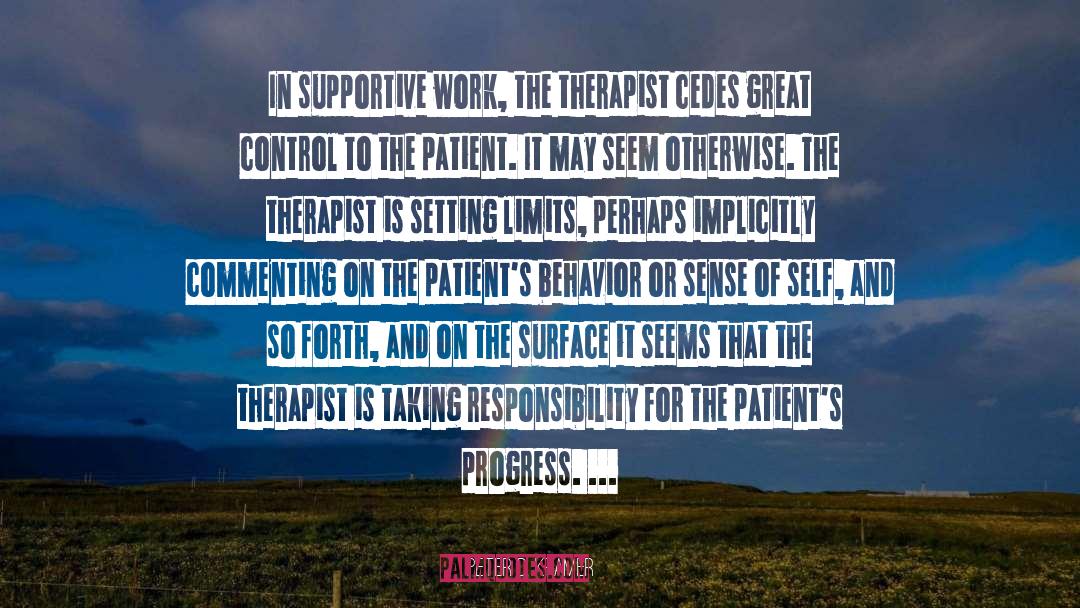
In short, Strict Father morality requires perfect, precise, literal communication, together with a form of behaviorism. Thus, Strict Father morality requires that four conditions on the human mind and human behavior must be met: 1. Absolute categorization: Everything is either in or out of a category. 2. Literality: All moral rules must be literal. 3. Perfect communication: The hearer receives exactly the same meaning as the speaker intends to communicate. 4. Folk behaviorism: According to human nature, people normally act effectively to get rewards and avoid punishments. Cognitive ~ George Lakoff

I had used eclectic therapy and behavior therapy on myself at the age of 19 to get over my fear of public speaking and of approaching young women in public. ~ Albert Ellis
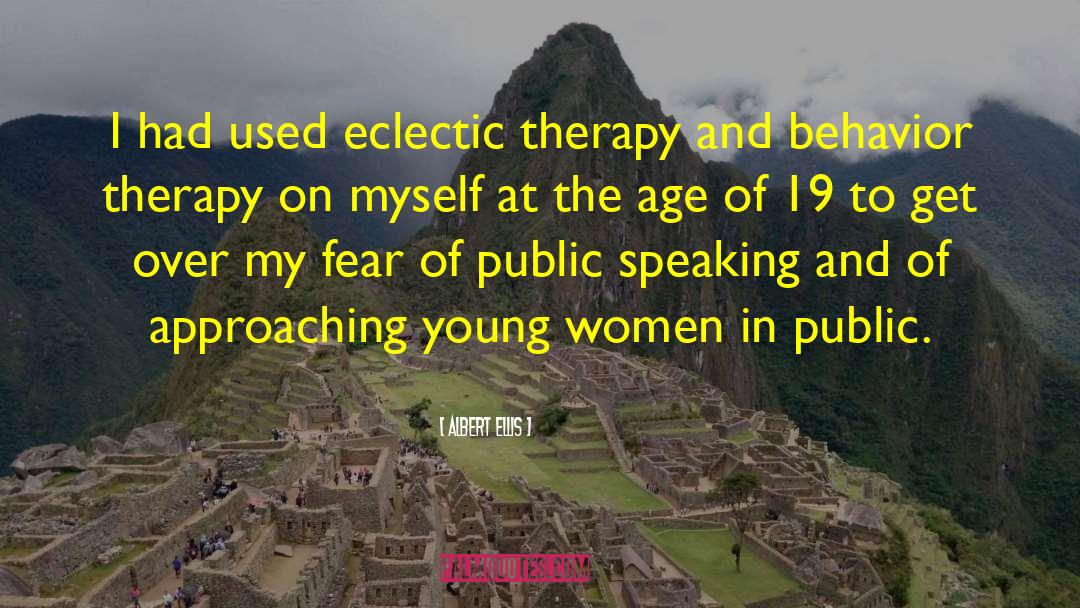
The Four Noble Truths are pragmatic rather than dogmatic. They suggest a course of action to be followed rather than a set of dogmas to be believed. The four truths are prescriptions for behavior rather than descriptions of reality. The Buddha compares himself to a doctor who offers a course of therapeutic treatment to heal one's ills. To embark on such a therapy is not designed to bring one any closer to 'the Truth' but to enable one's life to flourish here and now, hopefully leaving a legacy that will continue to have beneficial repercussions after one's death. (154) ~ Stephen Batchelor

[Skinner] does not invoke other events, processes, or mechanisms which are hypothesized or invented for the purpose of mediating between behavior and its empirical determinants. This omission is sometimes misconstrued as a denial that mediating mechanisms exist; they obviously do, they are obviously neurological and they are also obviously themselves lawful. ...The argument [against employing them as part of scientific practice] is simplicity itself... [Skinner] considers such theoretical terms unnecessary; they may generate research whose only usefulness is to disconfirm the mediating entity or redefine it without increasing our knowledge of behavior's controlling variables; they can become the absorbing focus of an inquiry and so deflect attention from behavior itself; they can become a "refuge from the data". ~ Kenneth MacCorquodale
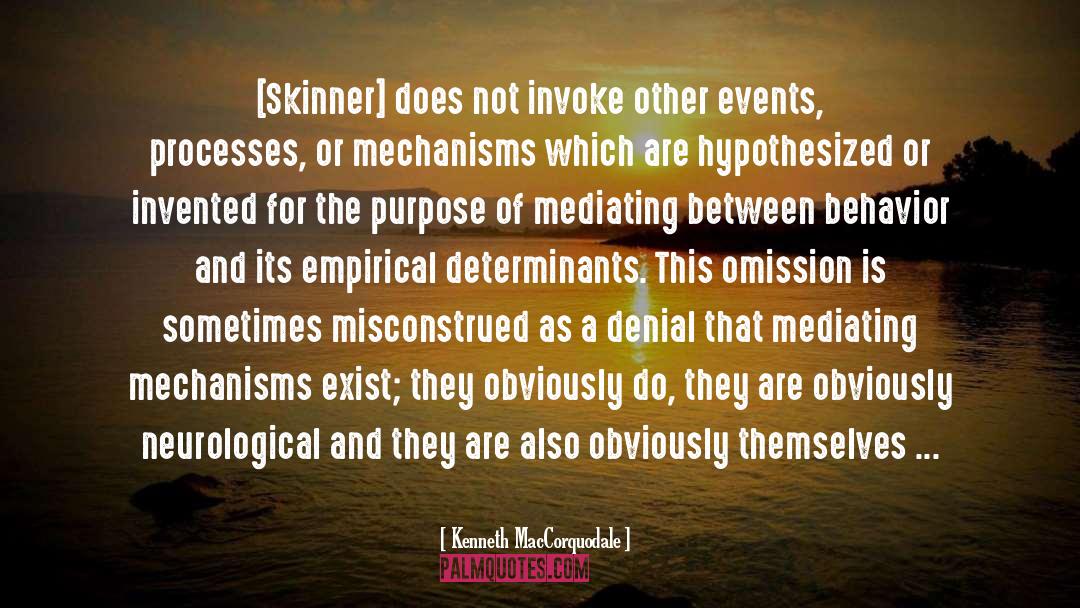
I suppose it's no surprise that we feel the need to dehumanize the people we hurt - before, during, or after the hurting occurs. But it always comes as a surprise. In psychology it's known as cognitive dissonance. It's the idea that it feels stressful and painful for us to hold two contradictory ideas at the same time (like the idea that we're kind people and the idea that we've just destroyed someone). And so to ease the pain we create illusory ways to justify our contradictory behavior. ~ Jon Ronson
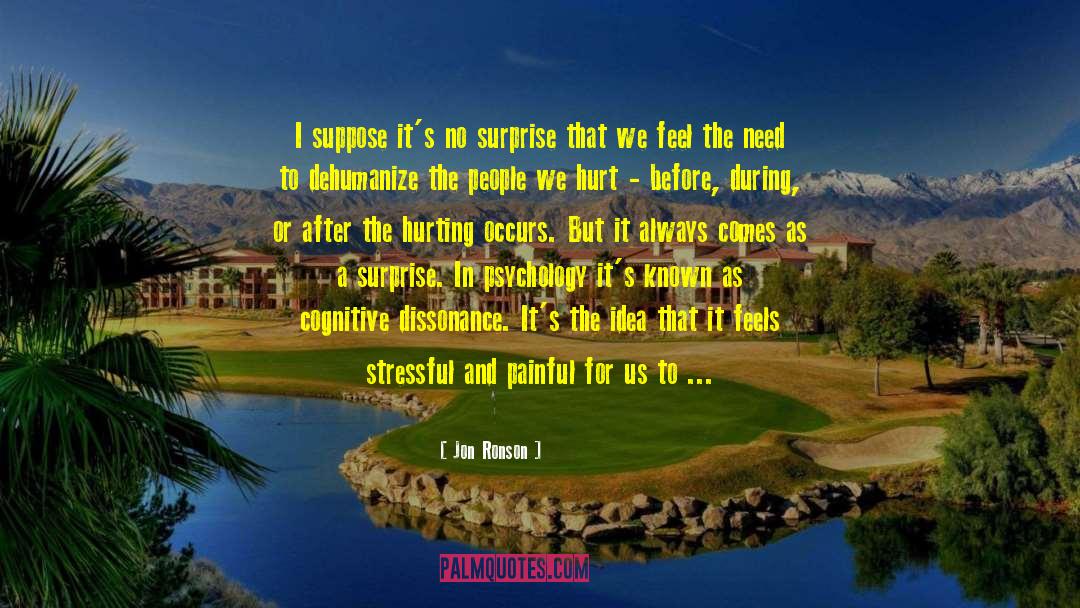
Still, children seem like empty vessels who pick up on everything and are so affected by their surroundings. I mean, that's what they tell me in therapy and it seems to be true. Stuff I don't consciously remember affects my behavior every day. I see that now ~ Nic Sheff
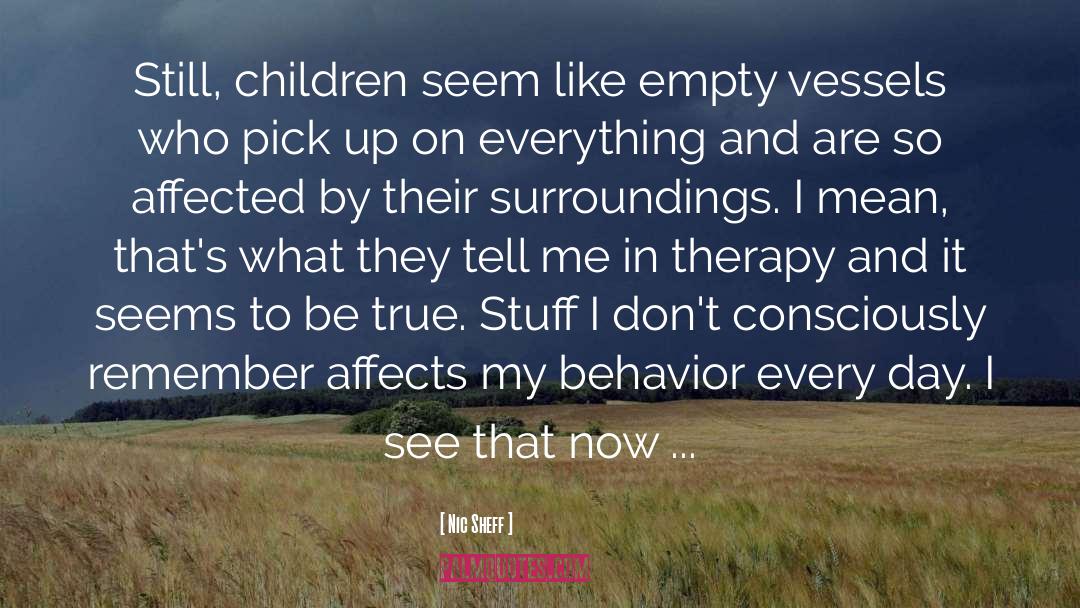
To tip the cognitive hurdle fast, tipping point leaders such as Bratton zoom in on the act of disproportionate influence: making people see and experience harsh reality firsthand. Research in neuroscience and cognitive science shows that people remember and respond most effectively to what they see and experience: "Seeing is believing." In the realm of experience, positive stimuli reinforce behavior, whereas negative stimuli change attitudes and behavior. Simply ~ W.Chan Kim
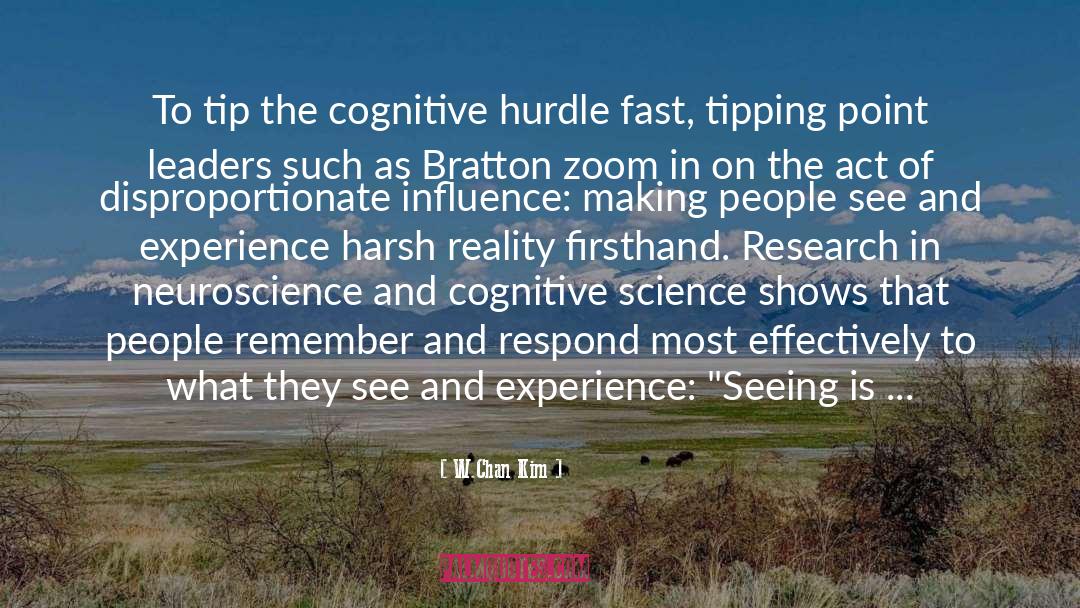
The overarching principle of a therapeutic relationship is that therapists should be ever mindful of a variant of the Hippocratic oath and, to the degree possible, strive to "do no more harm" (Courtois, 2010). Complex trauma clients have already experienced considerable harm, much of it at the hands of other human beings. As a result of the ubiquitous processes of transference, attachment styles, and IWM [Internal working models], these clients often view the therapist's behavior and their relationship through the lens of their trauma-related negative interpersonal expectancies and unhealed emotional wounds and injuries. Therapists should not be surprised to be "guilty until proven innocent", not because clients with complex trauma histories are "unfair" or "unreasonable" but precisely the opposite - because the most realistic self-protective stance for them (given the fact that betrayal and harm have been more the rule than the exception) is to "distrust first and verify" (or to be hypervigilant) rather than to start with an expectation of safety and trustworthiness. ~ Christine A. Courtois

Most therapy programs do little more than provide psychopaths with new excuses and rationalizations for their behavior and new insights into human vulnerability. They may learn new and better ways of manipulating other people. ~ Robert D. Hare

I am willing for the participant to commit or not commit himself to the group. If a person wishes to remain psychologically on the sidelines, he has my implicit permission to do so. The group itself may or may not be willing for him to remain in this stance but personally I am willing. One skeptical college administrator said that the main things he had learned was that he could withdraw from personal participation, be comfortable about it, and realize that he would not be coerced. To me, this seemed a valuable learning and one that would make it much more possible for him actually to participate at the next opportunity. Recent reports on his behavior, a full year later, suggest that he gained and changed from his seeming nonparticipation. ~ Carl R. Rogers
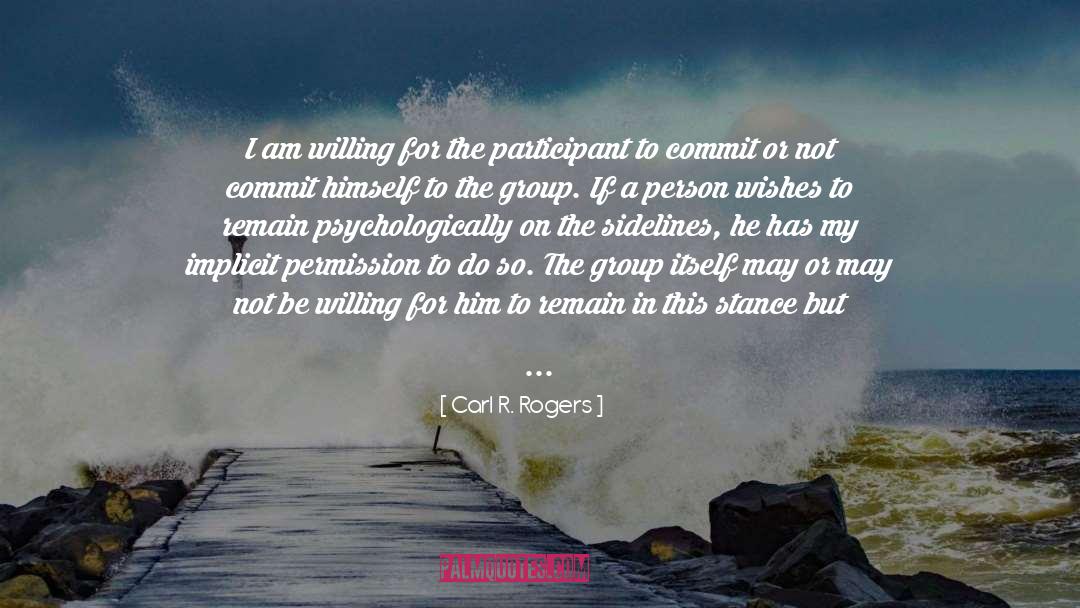
Rather, although belief may be adequate for explaining the behavior of individual animals - an animal which believes that p will behave no differently from an animal which knows that p - talk of knowledge is necessary once one begins to look at explaining the cognitive capacities of a species. ~ Hilary Kornblith
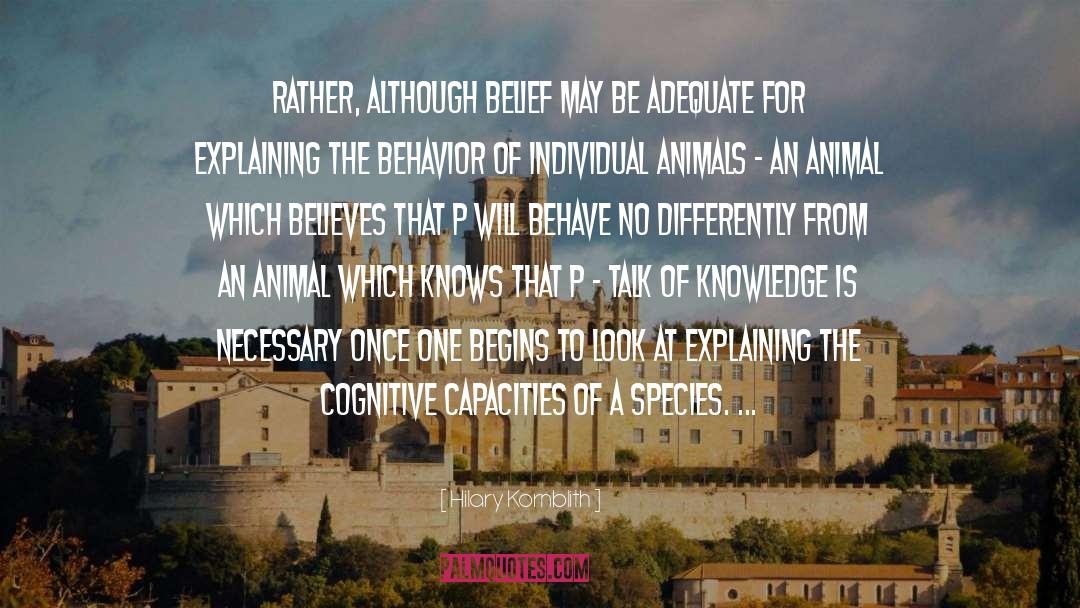
The word dialectic (in dialectical behavior therapy) means to balance and compare two things that appear very different or even contradictory. In dialectical behavior therapy, the balance is between change and acceptance (Linehan, 1993a). You need to change the behaviors in your life that are creating more suffering for yourself and others while simultaneously also accepting yourself the way you are. This might sound contradictory, but it's a key part of this treatment. Dialectical behavior therapy depends on acceptance and change, not acceptance or change. ~ Matthew McKay

When we apologize for something we've done, make amends, or change a behavior that doesn't align with our values, guilt - not shame - is most often the driving force. We feel guilty when we hold up something we've done or failed to do against our values and find they don't match up. It's an uncomfortable feeling, but one that's helpful. The psychological discomfort, something similar to cognitive dissonance, is what motivates meaningful change. Guilt is just as powerful as shame, but its influence is positive, while shame's is destructive. In fact, in my research I found that shame corrodes the very part of us that believes we can change and do better. ~ Brene Brown
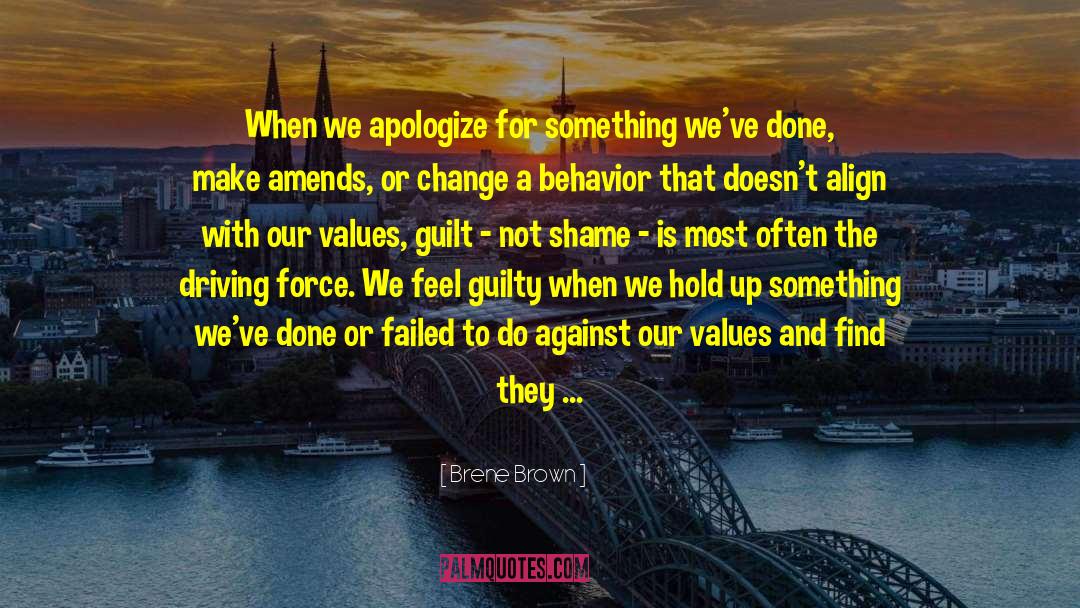
[That] the driving force of the evolution of human intelligence was the coordination of multiple cognitive systems to pursue complex, shared goals [is called] the social brain hypothesis. It attributes the increase in intelligence to the increasing size and complexity of hominid social groups. Living in a group confers advantages, as we have seen with hunting, but it also demands certain cognitive abilities. It requires the ability to communicate in sophisticated ways, to understand and incorporate the perspectives of others, and to share common goals. The social brain hypothesis posits that the cognitive demands and adaptive advantages associated with living in a group created a snowball effect: As groups got larger and developed more complex joint behaviors, individuals developed new capabilities to support those behaviors. These new capabilities in turn allowed groups to get even larger and allowed group behavior to become even more complex. ~ Steven Sloman
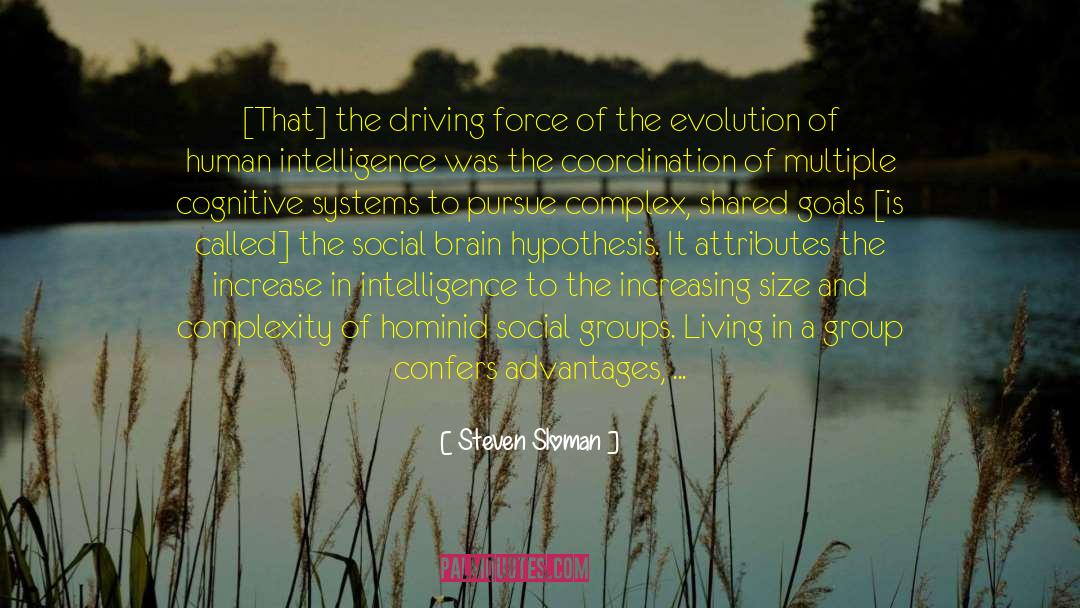
I began to see that the stronger a therapy emphasized feelings, self-esteem, and self-confidence, the more dependent the therapist was upon his providing for the patient ongoing, unconditional, positive regard. The more self-esteem was the end, the more the means, in the form of the patient's efforts, had to appear blameless in the face of failure. In this paradigm, accuracy and comparison must continually be sacrificed to acceptance and compassion; which often results in the escalation of bizarre behavior and bizarre diagnoses.
The bizarre behavior results from us taking credit for everything that is positive and assigning blame elsewhere for anything negative. Because of this skewed positive-feedback loop between our judged actions and our beliefs, we systematically become more and more adapted to ourselves, our feelings, and our inaccurate solitary thinking; and less and less adapted to the environment that we share with our fellows. The resultant behavior, such as crying, depression, displays of temper, high-risk behavior, or romantic ventures, or abandonment of personal responsibilities, which seem either compulsory, necessary, or intelligent to us, will begin to appear more and more irrational to others.
The bizarre diagnoses occur because, in some cases, if a 'cause disease' (excuse from blame) does not exist, it has to be 'discovered' (invented). Psychiatry has expanded its diagnoses of mental disease every year to include 'illnesses' like klepto ~ A.B. Curtiss

Even you, the professional helper, often mistaken for the enlightened Guru or Staretz, can become lost in your thoughts that you must be competent without fault. You may become enthralled with your identity as a professional, even the pressures of the culture of mastery that expects you to heal your clients without fail. Never mind all of the variables over which you have no control, it is up to you, according to the canons of mastery, to control the health and well-being of those for whom you provide professional care. This potentiates a furthering alienation between you and your clients. You are at risk to become, if you have not already, the one who does to your clients; to be the one the active subject acting upon the passive and receptive objects, your clients; to be the one in possession of special knowledge, technique and mastery. All of this conspires to coax or coerce you into treating your client as reduced, a mere case. Unawareness to these influences gives you little chance to consider their influence on your practice in the clinical setting, much less give attentive efforts to resist or change them. ~ Scott E. Spradlin
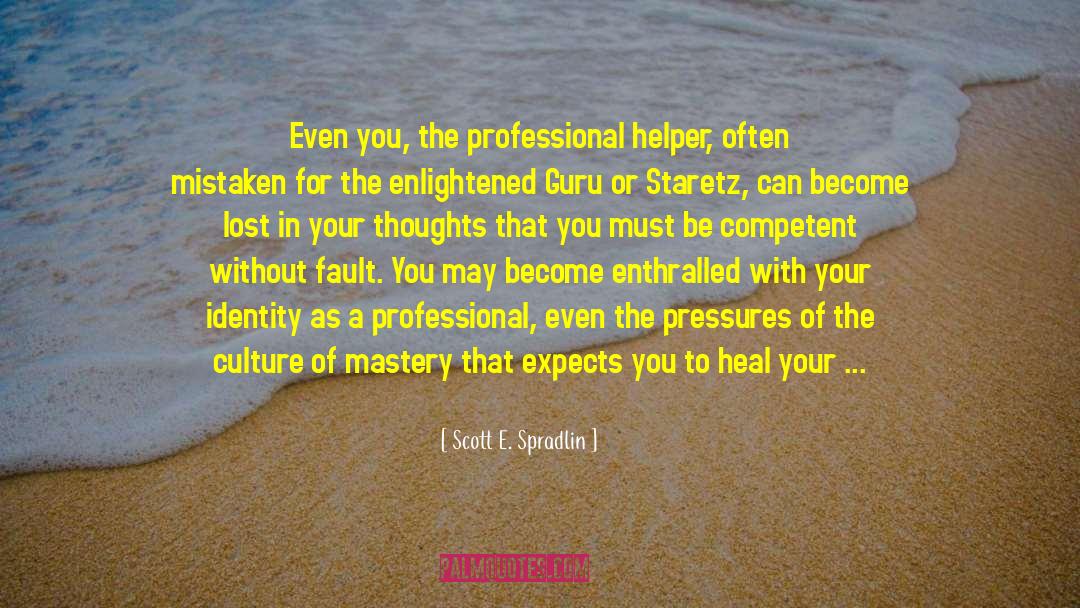
We try not using medications initially, and we use something called behavioral therapy for insomnia. This changes behaviors people do in bed, none of the tossing and turning. ~ Shelby Harris
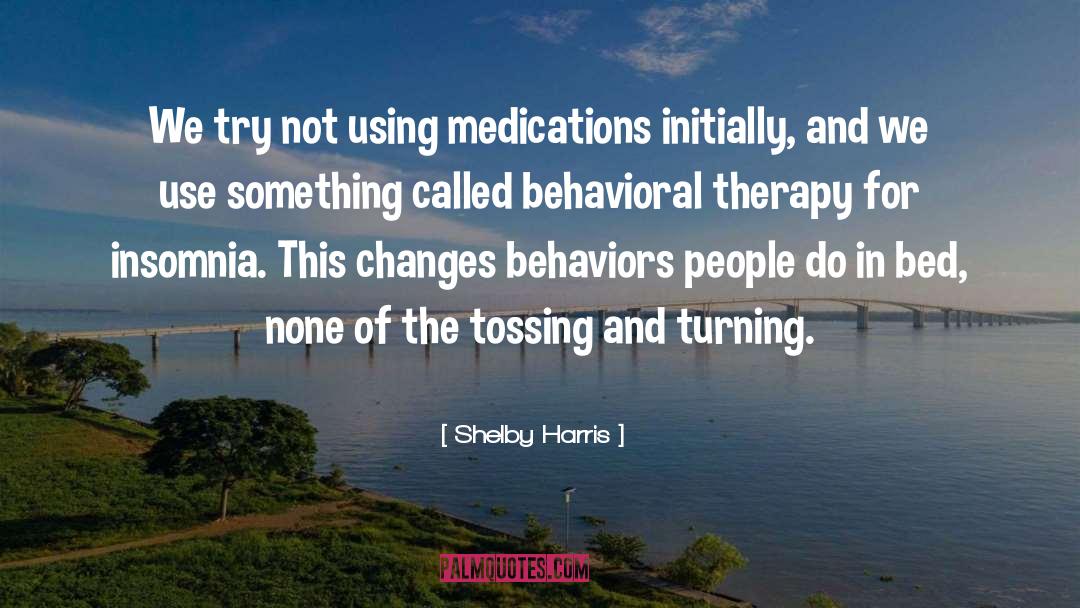
Our inherent cognitive biases make us ripe for manipulation and exploitation by those who have an agenda to push, especially if they can discredit all other sources of information. ~ Lee McIntyre
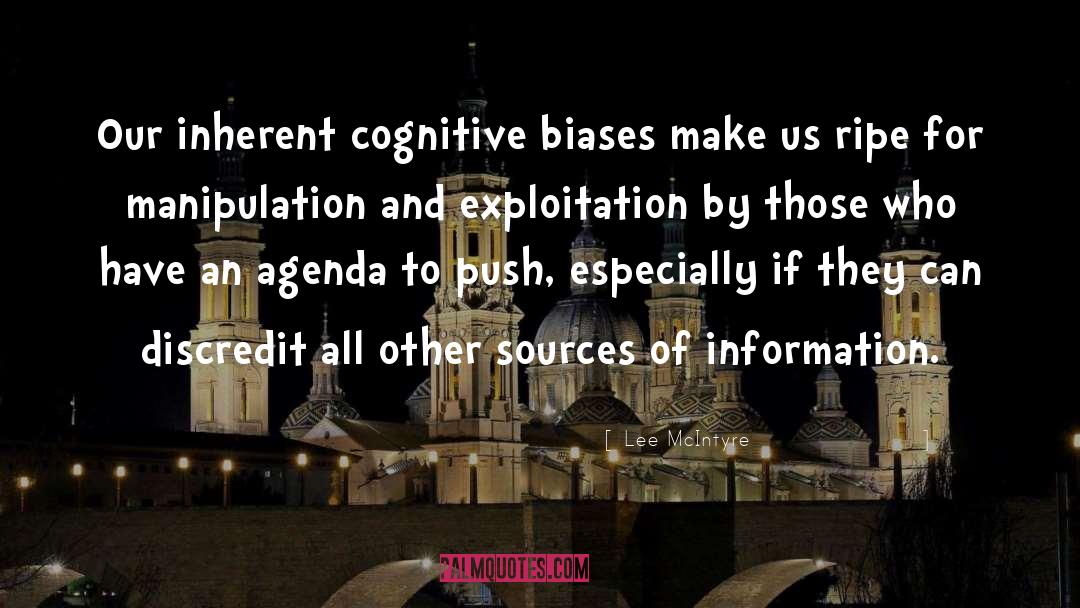
Barry Schlenker's self-identity theory (1982) asserts that self-presentation is an attempt to control information about your identity before real or imagined audiences - including yourself. People try to provide explanations of their own conduct; they try to construct an identity that is satisfying to themselves and that explains their behavior in a favorable light. One of the criteria of a good explanation is believability; that is, explanations must fit with existing knowledge. Schlenker argues that people are not motivated to attain cognitive consistency as an end in itself; rather, they need to provide a believable and self -beneficial account of their conduct, and consistency is a by-product of that. The need to provide explanations for your conduct results in the construction of an internally consistent view of reality. ~ James Kennedy

The cases described in this section (The Fear of Being) may seem extreme, but I have become convinced that they are not as uncommon as one would think. Beneath the seemingly rational exterior of our lives is a fear of insanity. We dare not question the values by which we live or rebel against the roles we play for fear of putting our sanity into doubt. We are like the inmates of a mental institution who must accept its inhumanity and insensitivity as caring and knowledgeableness if they hope to be regarded as sane enough to leave. The question who is sane and who is crazy was the theme of the novel One Flew Over The Cuckoo's Nest. The question, what is sanity? was clearly asked in the play Equus.
The idea that much of what we do is insane and that if we want to be sane, we must let ourselves go crazy has been strongly advanced by R.D. Laing. In the preface to the Pelican edition of his book The Divided Self, Laing writes: "In the context of our present pervasive madness that we call normality, sanity, freedom, all of our frames of reference are ambiguous and equivocal." And in the same preface: "Thus I would wish to emphasize that our 'normal' 'adjusted' state is too often the abdication of ecstasy, the betrayal of our true potentialities; that many of us are only too successful in acquiring a false self to adapt to false realities."
Wilhelm Reich had a somewhat similar view of present-day human behavior. Thus Reich says, "Homo normalis blocks off entirely the perce ~ Alexander Lowen
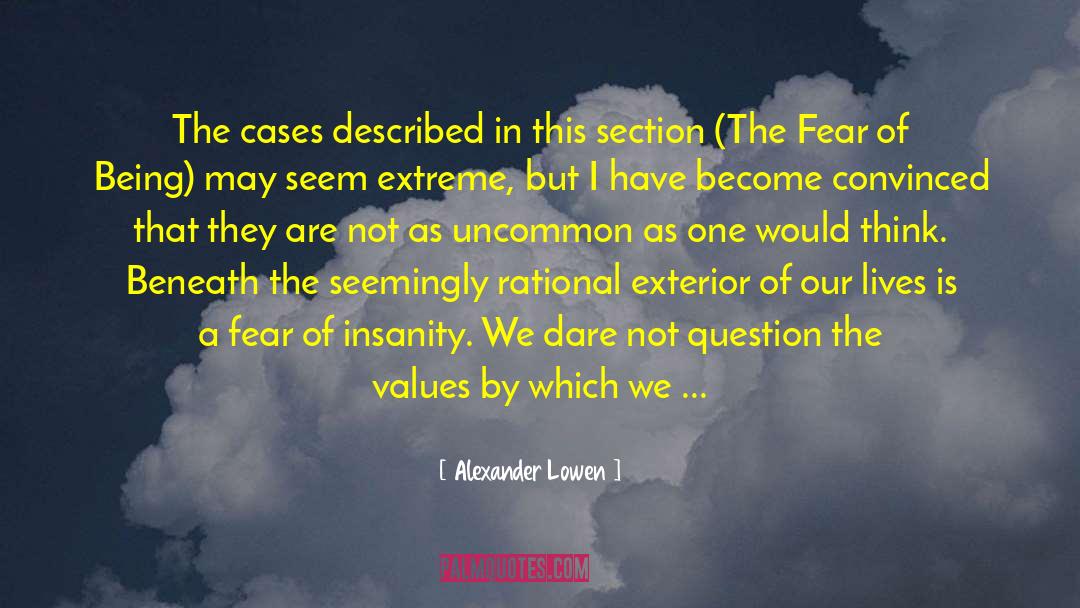
Consumption is a universal phenomenon. All humans consume varieties of products, many of which beyond actual necessity, because it activates the brain's reward center. And the more a certain product activates the reward center with its unique characteristics or its predominant social stature, the more that product gets chiseled into the long-term memory of the consumer, making it a fundamental part of the individual's psychological well being. Thus the human mind grows a deep psychological bond with a product. And this bond can grow so strong in time that it would defend itself from all sorts of criticisms. It is the brain's way to maintain its internal purely individualistic well being. Hence, a strong psychological bond between the mind and a product slowly not only becomes invincible to criticisms, but also, develops its own cognitive immune system against such criticisms. ~ Abhijit Naskar
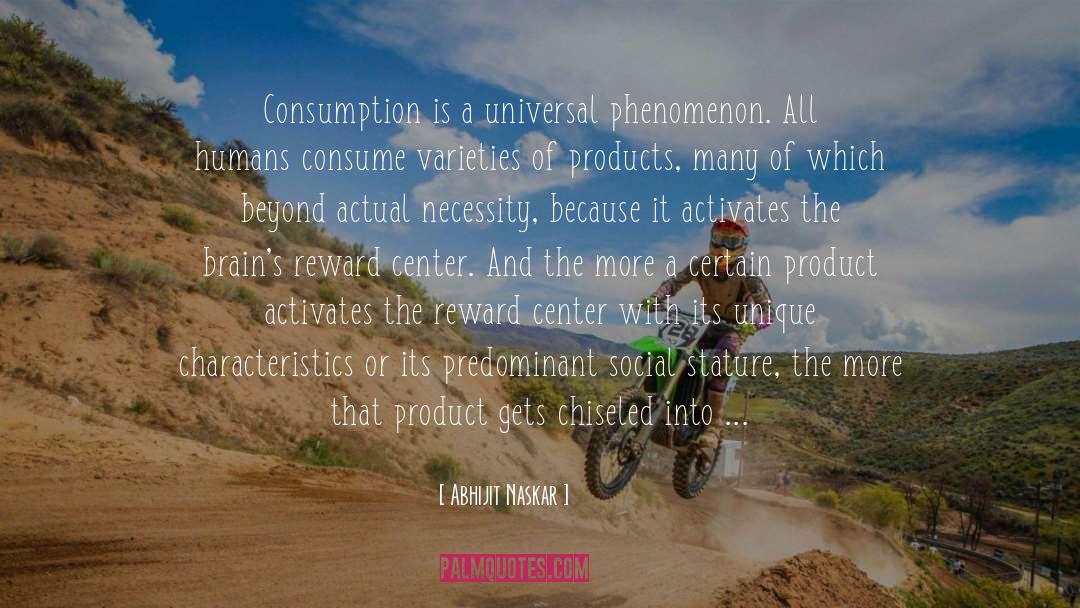
Of course, a culture as manically and massively materialistic as ours creates materialistic behavior in its people, especially in those people who've been subjected to nothing but the destruction of imagination that this culture calls education, the destruction of autonomy it calls work, and the destruction of activity it calls entertainment. ~ James Hillman

Cognitive insight (knowing something) is not like emotional insight (feeling something). It has no psychodynamic effects. It does not affect the narcissist's behavior patterns, or his interpersonal interactions - the products of well entrenched and rigid defense mechanisms. ~ Sam Vaknin
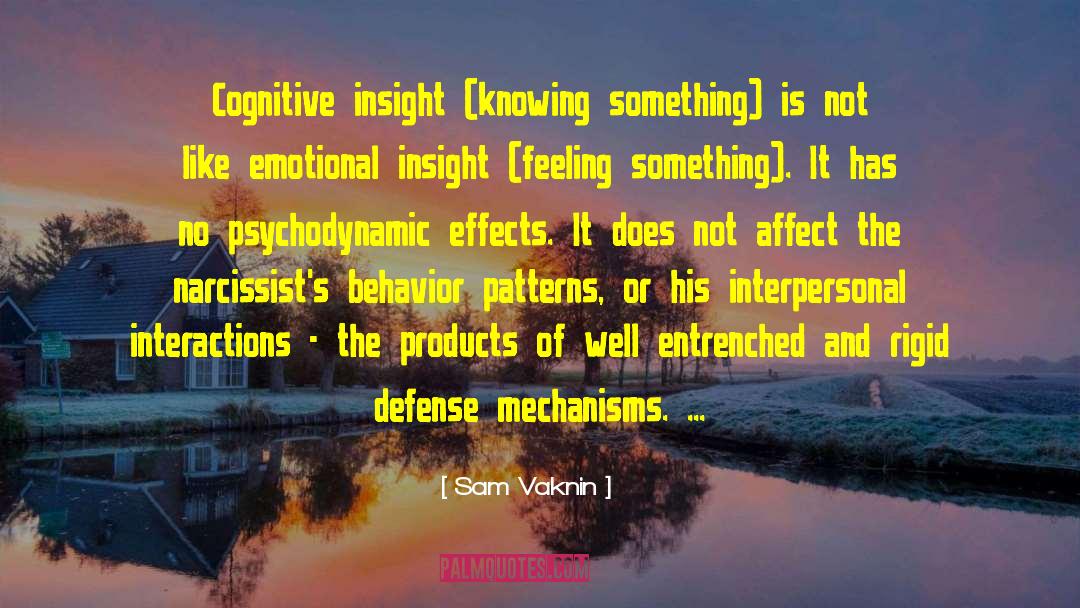
Traumatic events challenge an individual's view of the world as a just, safe and predictable place. Traumas that are caused by human behavior. . . commonly have more psychological impact than those caused by nature. ~ American Psychological Association

